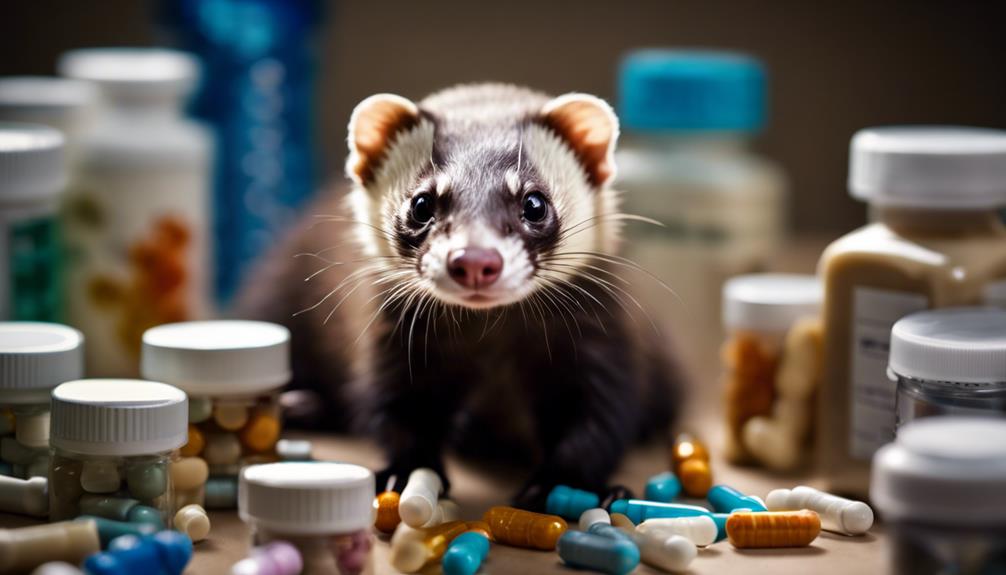Do Ferrets Benefit From Probiotic Supplements?

Probiotic supplements can help improve digestion in ferrets, which is crucial for nutrient absorption and overall health.
These supplements can also aid in preventing gastrointestinal issues and maintaining a balanced gut flora.
Incorporating probiotics into a ferret's diet can support their immune system and reduce the risk of infections.
Overall, probiotic supplements play a vital role in ensuring the well-being and longevity of ferrets.
Understanding Ferret Digestive System
The ferret digestive system efficiently breaks down protein-rich foods due to its short gastrointestinal tract and powerful enzymes. Ferrets are obligate carnivores, requiring a diet high in animal-based proteins and fats. Their digestive system is adapted to process these nutrients efficiently. Ferret nutrition plays a crucial role in maintaining their health and wellbeing.
Digestive enzymes are essential for breaking down proteins, fats, and carbohydrates in the ferret's diet. Proteases, lipases, and amylases are key digestive enzymes that aid in the breakdown of different food components. These enzymes are produced by the pancreas and other organs in the digestive system.
Understanding the role of digestive enzymes in ferrets is vital for ensuring proper nutrition and overall health. Proper digestion of nutrients is essential for the ferret's energy production, growth, and maintenance. By providing a diet rich in animal proteins and fats, along with supporting their digestive system with the necessary enzymes, ferret owners can help their pets thrive.
Importance of Gut Microbiota in Ferrets

Ferret digestive health is closely linked to the composition and balance of their gut microbiota. The gut microbiota, composed of various microorganisms, plays a crucial role in maintaining gut flora diversity in ferrets. This diversity is essential for proper digestion, absorption of nutrients, and overall health. Moreover, research suggests that the gut microbiota can influence ferret behavior by affecting neurotransmitter levels in the gut-brain axis.
Probiotic strains can contribute to enhancing gut flora diversity in ferrets. By introducing beneficial bacteria into the gut, probiotics can help maintain a healthy balance of microorganisms, supporting digestive functions and potentially influencing ferret behavior positively. Additionally, probiotics may play a role in boosting ferret immunity by modulating the immune response in the gut.
Understanding the importance of gut microbiota in ferrets is crucial for ensuring their overall well-being. By promoting a healthy gut environment through probiotics and other means, ferret owners can support their pets' digestive health, behavior, and immunity.
Potential Benefits of Probiotics for Ferrets

Regularly supplementing ferrets with probiotics can significantly enhance their gut flora diversity and support overall digestive health. This can lead to various potential benefits for ferrets:
- Improved Digestion: Probiotics help maintain a healthy balance of good bacteria in the gut, aiding in the digestion and absorption of nutrients from their food.
- Enhanced Immune Function: A healthy gut flora is closely linked to a robust immune system, potentially reducing the risk of infections and illnesses in ferrets.
- Balanced Behavior: Research suggests that probiotics may have a positive impact on ferret behavior by influencing the gut-brain axis, which could help in reducing stress and anxiety levels.
Research Studies on Ferrets and Probiotics

Recent research studies have shed light on the impact of probiotics on ferret gut health. These studies suggest that these supplements may play a significant role in promoting digestive balance.
The effectiveness of probiotics in supporting the overall well-being of ferrets is a subject of ongoing investigation, with promising insights emerging regarding their potential benefits.
Understanding the specific mechanisms through which probiotics exert their effects on ferrets can provide valuable information for optimizing their use in promoting digestive health in these animals.
Ferret Gut Health
Maintaining optimal gut health in ferrets has been a subject of interest in various research studies investigating the effects of probiotic supplements. Understanding the role of gut flora and its impact on digestive health is crucial for ensuring the overall well-being of these animals. Research has shown the following key points:
- Gut Flora Balance: Studies suggest that probiotic supplements can help maintain a healthy balance of gut flora in ferrets.
- Improved Digestion: Probiotics may contribute to improved digestive health by aiding in the breakdown and absorption of nutrients.
- Enhanced Immune Function: Some research indicates that probiotics could potentially enhance the immune function of ferrets through promoting a healthy gut environment.
Probiotic Effectiveness
Studies have demonstrated the efficacy of probiotic supplements in enhancing gut health in ferrets.
Probiotic strains like Lactobacillus and Bifidobacterium have been found to positively influence the balance of gut microbiota in ferrets, leading to improved digestion and overall health.
These probiotics work by promoting the growth of beneficial bacteria in the digestive tract, which can help enhance nutrient absorption and reduce the risk of gastrointestinal issues.
Additionally, probiotics have been shown to support ferret immunity by modulating the immune response in the gut, potentially reducing the incidence of infections and boosting overall immune function.
Digestive Balance Support
Numerous research studies have shown the positive effects of probiotic supplements on digestive balance in ferrets. These supplements can help in maintaining a healthy gut flora, which is essential for overall digestive health. Some key benefits include:
- Improved Gut Flora: Probiotics promote the growth of beneficial bacteria in the ferret's digestive system, aiding in digestion and nutrient absorption.
- Enhanced Digestive Health: By maintaining a proper balance of gut flora, probiotics can help prevent digestive issues such as diarrhea or constipation in ferrets.
- Supporting Nutrient Absorption: A balanced gut flora can improve the absorption of essential nutrients from the ferret's diet, promoting overall health and well-being.
Choosing the Right Probiotic Supplement

Selecting the appropriate probiotic supplement for ferrets is crucial to ensure their digestive health and overall well-being. When choosing a probiotic supplement for your ferret, it is essential to consider specific probiotic strains that are beneficial for their gut health. Additionally, taking into account your ferret's diet is essential as it can influence the effectiveness of the probiotic supplement. Understanding the probiotic benefits for ferrets can aid in making an informed decision regarding which supplement to choose.
| Probiotic Strains | Ferret Diet | Gut Health |
|---|---|---|
| Lactobacillus | High in protein | Supports digestion |
| Bifidobacterium | Low in carbohydrates | Maintains microbial balance |
| Enterococcus | Rich in fats | Strengthens immune system |
How to Introduce Probiotics to Ferrets

When introducing probiotics to ferrets, it's essential to consider the appropriate dosage for these small animals.
Monitoring the ferret's health closely after introducing probiotics is crucial to ensure they're responding well to the supplement.
Keeping a watchful eye on any changes in their digestion or overall well-being is recommended when starting probiotics.
Probiotic Dosage for Ferrets
Introducing probiotics to ferrets can be effectively done by gradually incorporating small doses into their daily diet. When determining the appropriate dosage for your ferret, consider factors like age, health condition, and the specific probiotic supplement being used.
Here are some general guidelines to follow:
- Start Slow: Begin with a small amount of probiotics and gradually increase the dosage over a few weeks.
- Follow Manufacturer Recommendations: Always adhere to the dosage instructions provided by the probiotic brand you choose.
- Monitor Ferret's Response: Observe your ferret for any signs of digestive upset or adverse reactions when introducing probiotics.
Monitoring Ferret's Health
To ensure the successful introduction of probiotics to ferrets, it's crucial to carefully monitor their health for any changes or reactions.
When introducing probiotics, it's recommended to observe the ferret for any signs of gastrointestinal upset, such as diarrhea, vomiting, or decreased appetite. Any sudden changes in behavior or appearance should be noted promptly.
Additionally, it's essential to monitor the ferret's stool consistency and overall well-being. If any concerning symptoms arise, consulting a veterinarian is advised to determine the best course of action.
Monitoring the ferret's health closely during the introduction of probiotics, along with any dietary changes, will help ensure a smooth transition and optimal health outcomes for the ferret.
Monitoring Ferret's Response to Probiotics

Monitoring the ferret's response to probiotics is essential in evaluating the effectiveness of the supplementation on their digestive health. This process involves observing various aspects of the ferret's well-being to determine if the probiotics are positively impacting their overall health.
Here are three key factors to monitor:
- Probiotic Consumption: Keep track of the ferret's daily intake of probiotics to ensure they're receiving the recommended dosage for their size and health needs.
- Behavior Changes: Note any changes in the ferret's behavior such as increased activity levels, improved appetite, or reduced signs of gastrointestinal distress, which could indicate a positive response to the probiotics.
- Ferret Weight and Stool Consistency: Regularly weigh the ferret and monitor their stool consistency. A stable weight and healthy stool consistency are indicators of good digestive health, potentially influenced by probiotic supplementation.
Frequently Asked Questions
Can Probiotics Be Harmful to Ferrets if Given in Excess?
Excessive probiotics can pose potential risks to ferrets. To avoid harm, it's crucial to adhere to the recommended dosage. Monitoring intake and consulting a veterinarian ensures the well-being of these pets when considering probiotic supplements.
Are There Any Specific Probiotic Strains That Are More Beneficial for Ferrets?
When it comes to probiotic strains for ferrets, certain ones may be more beneficial. Ensuring appropriate probiotic dosages and considering ferret diet is crucial. Understanding how these strains interact with ferret behavior can enhance their overall health.
How Long Does It Typically Take to See the Effects of Probiotics in Ferrets?
When administering probiotics to ferrets, it's essential to consider the time frame for seeing effects. Typically, probiotic effectiveness can vary, but noticeable changes may occur within a few weeks. Dosage recommendations should align with the specific needs of the ferret.
Can Probiotics Help With Specific Health Conditions in Ferrets, Such as Digestive Issues or Immune System Support?
Probiotics are known to aid in weight management, support skin health, alleviate respiratory issues, and aid in stress management in ferrets. Research shows these supplements can benefit specific health conditions, contributing to overall well-being.
Are There Any Potential Side Effects of Probiotics for Ferrets That Owners Should Be Aware Of?
When considering probiotics for ferrets, it's important to be aware of potential risks and long-term effects. Owners should follow dosage recommendations and administration tips carefully to ensure the well-being of their pets.











